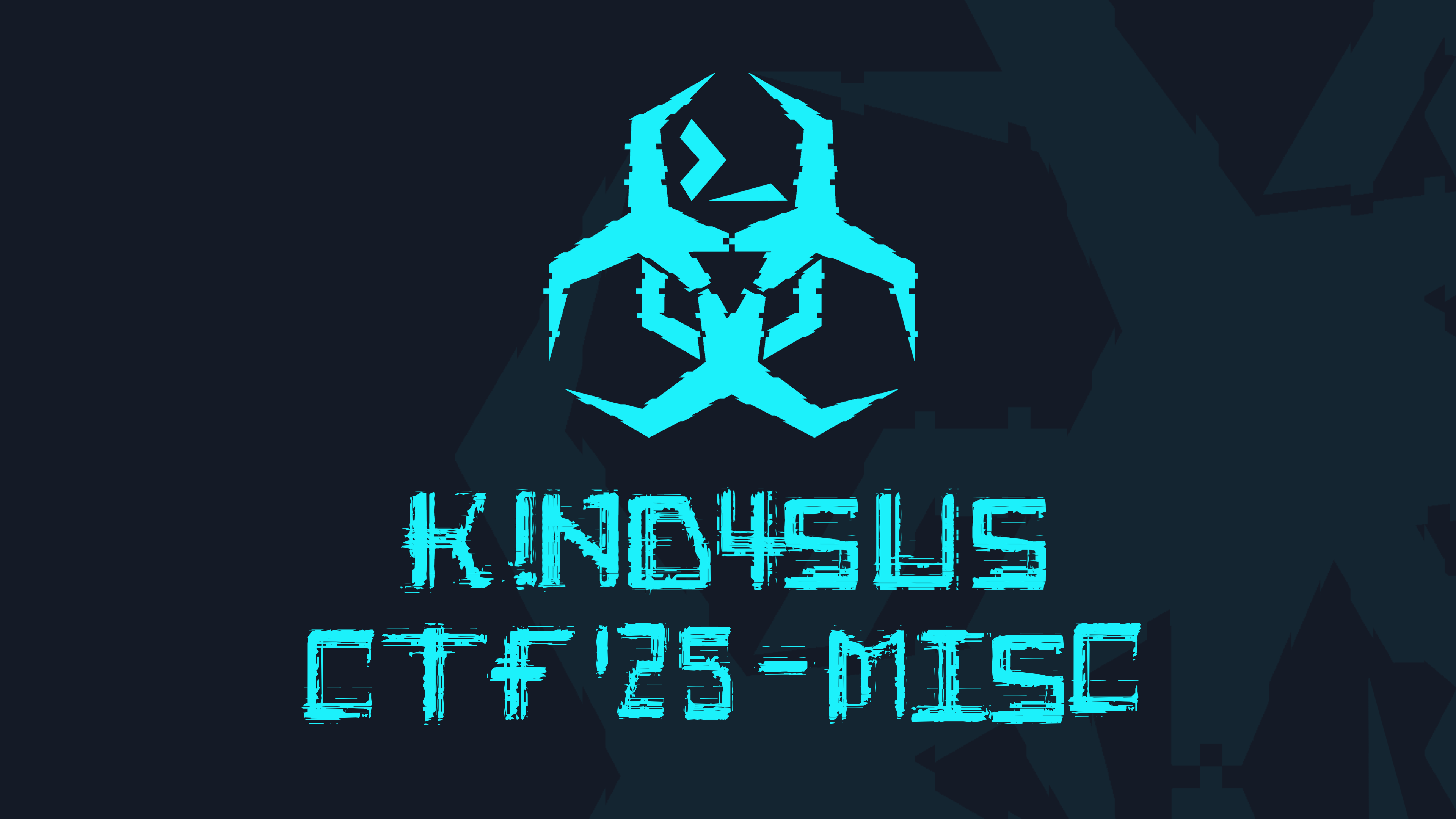(misc) K!nd4SUS CTF 2025 Writeups

Misc Writeups
Talking to the Void
On a unix system, what the users are doing is visible to other users. The w command is our target. It will be a prefix of step() on average once every 64 attempts. A partial solution is to spam shell 1, but the answer would not be understandable. Fortunately, _memory never sees the original (empty) _state. So reset() will not intercept seed="". Therefore, we can travel back in time by sending reset without arguments when we see a good answer with step. To avoid long runs, we can reset the internal secret after every step, triggering a hard reset with reset. Note: Due to difficulties in making w work in a container the actual script on the server had a modified run(). The modified function intercepts the first argument w and gives the correct answer. To account for unintended solution the actual run() is called in all the other cases. EDIT: The original script had a bug that could compromise the availability of the challenge. Therefore it had to be patched during the competition (there were surely better fix that retained the unintended solution but I wasn’t able to implement them at the time). Sorry about that. Waiting for sh instead of w provided a blind remote shell, this was because the input parameter for run() was not set.
from subprocess import Popen, PIPE
from base64 import b64decode
from time import sleep
cmd = 'python server.py'
process = Popen(cmd
, shell=True, text=True
, stdin=PIPE, stdout=PIPE)
def get_line():
line = process.stdout.readline()
if not line and process.poll() is not None:
exit()
print(line, end='', flush=True)
return line
def get_lines():
while True:
line = get_line()
if not line:
sleep(.1)
if line.startswith("?"):
break
def send(query):
print(query)
query += "\n"
process.stdin.write(query)
process.stdin.flush()
def step():
send("step")
sleep(.1)
ans = get_line().strip()
return ans
def unscramble(secret, message):
secret = b64decode(secret)
message = b64decode(message)
ans = bytes(x ^ y for x, y in zip(secret, message))
try:
ans = ans.decode()
except:
ans = str(ans)
return ans
while True:
get_lines()
ans = step()
if ans.startswith("w"):
break
get_lines()
send("reset " + ans)
secret = ans
get_lines()
send("reset")
get_lines()
send("shell 1")
while True:
line = get_line().rstrip()
if not line:
sleep(3)
continue
if line.startswith("?"):
break
if '.' not in line and ':' not in line:
print(unscramble(secret, line))
get_lines()
break
get_lines()
assert FalseWhats in a Nimi
In this challenge, we have a very cryptic text written using strange symbols. By using Google Lens or a similar service, we find many pictures of glyphs, and the images most similar to this one contain the text: “Toki Pona.”
Toki Pona (tok: toki pona) is a constructed language (conlang) that has a writing system called sitelen pona (literally “good writing”), which is exactly the same as the one employed here.
We can therefore transliterate the text, obtaining the following:
mi mute li kulupu ni: jan pi kama sona. mi mute li kama sona e sona pi ilo sona. mi mute li tan ma [Italija]. ni li pona tawa mi mute: mi mute li toki suli e utala sin. tan ni ale la mi mute li sitelen kepeken toki pona. toki pona li pona anu seme? jan ale li toki e toki pona. sina toki ala toki e toki pona? toki pona li toki pali. jan [Sonja] li pali e ni. ona meli li tan ma [Kanata]. ona meli li wawa mute. mi mute ale li wile kama sona e toki pona. sina wile ala wile kama sona e toki pona? sina wile pali e ni: sina tawa sona e toki pona. ni la sina ken lukin e lipu mute. len sitelen li ni: nimi pi nanpa pini “lipu tenpo”. ni li sama e [KSUS]”{” len sitelen ”}”. tan jan [Samele]
Which might be translated into:
We are a group of this: students. We study knowledge about knowledge devices (computer science) We are from Italy This is good/happy for us: we announce a new challenge. Because of this all, we write using toki pona. Isn’t toki pona good? toki pona is a constructed language. Person Sonja works on it. She is from Canada. She is very strong. We all want to learn toki pona. Do you want to learn toki pona? You want to work on this: you learn toki pona. In this context, you can look at several books/publications/papers. The written textile/secret (flag) is this: the name of the last edition of “lipu tenpo”. This is equal to ksus{flag} (uses the format indicated, reasonably). by person Samele (Samuele)
The name of the last edition of the magazine “lipu tenpo” is “nanpa kala”. We can try to submit “ksus{nanpa kala}” as the flag.
ksus{nanpa kala}
Also accepted with underscores, capital letters, etc.
Cybersecurity, Gamified
Writeup PDF here: https://github.com/K1nd4SUS/KSUSCTF25_Writeups/blob/main/MISC/cybersecurity_gamified.pdf
